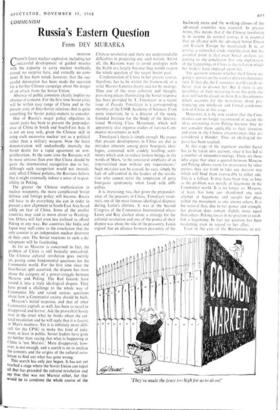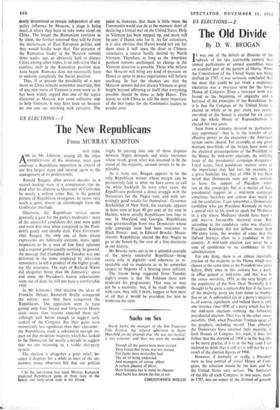Russia's Eastern Question
COMMUNISM From DEV MURARKA
MOSCOW
CHINVS latest nuclear explosion, including her k..,successful development of guided missiles with the capacity to carry nuclear warheads, caused no surprise here, and virtually no com- ment. It has been noted, however, that the suc- cessful detonation has been made the occasion for a further Chinese campaign about the danger of an attack from the Soviet Union.
Absence of public comment clearly implies no absence of concern. For the first time Soviet cities will be within easy range of China and in the present state of Sino-Soviet relations that is quite something for Soviet policy-makers to consider.
One of Russia's major policy objectives in recent years has been to prevent the preponder- ance of China in South and South-East Asia. It is not an easy task, given the Chinese skill in using each successive nuclear test as a political rather than a military weapon. Now the latest demonstration will undoubtedly intensify the Soviet desire for a rapid agreement on non- proliferation. At the same time the Russians will be more anxious than ever that China should be given the international recognition due to her. Although such recognition would not immedi- ately affect Chinese policies, the Russians believe that it might eventually induce a sense of respon- sibility in Peking.
The greater the Chinese sophistication in nuclear weaponry, the more complicated Soviet defence and foreign policy will become. Russia will have to do everything she can in order to prevent a new alignment in South-East Asia based solely on fear of China. Some of the smaller countries may tend to move closer to Washing- ton. Others will feel even less inclined to offend Peking in any way. But countries like India and Japan may well come to the conclusion that the only counter is an independent nuclear deterrent of their own. The Soviet reactions to such a de- velopment will be fascinating.
As far as Moscow is concerned in fact, the problem of China is still basically unresolved. The Chinese cultural revolution goes merrily on, posing some fundamental questions for the Communist world. For the first time since the Sino-Soviet split occurred, the dispute has risen above the category of a power-struggle between Moscow and Peking. The Red Guards have turned it into a truly ideological dispute. They have posed a challenge to the whole way of Communist life and raised serious questions about how a Communist society should be built.
Moscow's initial response, and that of other Communist capitals as well, has been to recoil in disapproval and horror. Ask the proverbial Soviet man in the street what he thinks about the cul- tural revolution and he will reply that it is fascist, or Mao's madness. Yet it is infinitely more diffi- cult for the CPSU to make this kind of judg- ment, at least in public. Soviet leaders have gone no further than saying that what is happening in China is `not Marxist.' Mere disapproval, how- ever, is not enough, and a search is on to analyse the contents and the origins of the cultural revo- lution to find out what has gone wrong.
This search has only just begun. It has not yet reached a stage where the Soviet Union can reject all that has preceded the cultural revolution and say that that was not Marxist either, for that would be to condemn the whole course of the Chinese revolution and there are understandable difficulties in projecting any such notion. Above all, the Russians want to avoid analogies with the Stalin era largely because they would reopen the whole question of the recent Soviet past.
Condemnation of China in her present course, therefore, has to be within the framework of a strict Marxist-Leninist theory and not by analogy. Thus one of the most coherent and thought- provoking pieces illuminating the Soviet response has been provided by T. Timofeyev in a recent issue of Pravda. Timofeyev is a corresponding member of the USSR Academy of Sciences. Even more important, he is a director of the newly founded Institute for the Study of the Interna- tional Working Class Movement, which will apparently also organise studies of various Com- munist movements as well.
Timofeyev's thesis is simple enough. He argues that present developments in China are due to mistakes inherent among petty bourgeois ideo- logies, consumed with crudely levelling senti- ments which seek to reduce human beings, in the words of Marx, `to the unnatural simplicity of an impoverished man without any requirements.' Such mistakes can be caused, he says, simply by lack of self-control in the leaders of the revolu- tion who cannot resist the temptation of petty bourgeois spontaneity when faced with diffi- culties.
It is interesting, too, that given the preponder- ance of the peasants in China, Timofeyev resur- rects one of the most famous ideological disputes during Lenin's lifetime. It was at the Second Congress of the Communist International where Lenin and Roy clashed about a strategy for the colonial revolution and one of the points of their dispute was about the thle of the peasantry. Lenin argued that an alliance between peasantry of the
'They've made the fence too high for us to sit on!' backward areas and the working classes of the advanced countries was essential. In present terms, this means that if the Chinese revolution is to resume its normal course, it is essenti il that an alliance with the advanced Soviet Union and Eastern Europe be maintained. It is, of course, a somewhat crude simplification, but the essential point is that even Soviet analyst; are coming to the conclusion that one explanation of the happenings in China is the isolation which her leaders have imposed upon her.
The question remains whether the Chinese are going to persist on the road to ultra-revolutionar■. ruin. If they do. the Communist world can do nc better than to disown her. But if there is an possibility of their retreating from this path, the door will not be closed on them. It is this dilemma which accounts for the hesitations about pro- nouncing any wholesale and formal condemna- tion of China at this stage.
Moreover, it is by now evident that the Com- munists can no longer recommend or accept the ideas emanating from Peking because they do not consider them applicable to their situation, and even in the Chinese circumstances they are considered a blunder. Thus an ideological im- passe has been reached.
At this stage of the argument another factor has to be taken into account, since it has led to a number of misunderstandings. There are those who argue that since a quarrel between Moscow and Peking allows room for manoeuvre by other parties, they are loath to take any decisive step which will bind them irrevocably to either side. This is a fallacy. It may have been true as long as the problem was merely of hegemony in the Communist world. It is no longer so. Moscow, at least, has long ago abandoned any such attempt at hegemony and accepts her place within the movement as one among others. It is but natural that, due to her power and strength, her position does remain slightly more equal than others. Peking, too, is in no position to estab- lish a hegemony. In fact her position has been weakening even in regard to her allies.
Even in the case of the Rumanians, so evi- deafly deterMined to remain independent of any policy influence by Moscow, a stage is being reackzd where they have to take some stand on China. The longer the Rumanians continue to be silent, the further removed they will be from the mainstream of East European politics and they would hardly want that. The presence of the Rumanian leader at the Moscow summit three weeks ago, so obviously held to discuss China among other topics, is an indication that a cautious shift in the Rumanian position may have begun. Rumania does not necessarily have to endorse completely the Soviet position.
Thus, if at present the possibility of a new move on China remains somewhat uncertain, that of any new move of Vietnam is even more so. It has been widely argued that one of the topics discussed at Moscow was some collective step to help Vietnam. It may have been so, because no one can say anything with certainty. The point is however, that there is little more the Communist world can do at the moment short of declaring a formal war on the United States. Help to Vietnam has been stepped up, and more will be sent if Hanoi asks for it. As for volunteers, it is also obvious that Hanoi would not ask for them since it will open the door to Chinese volunteers, a course hardly desired by North Vietnam. Therefore, so long as the American position remains unchanged, no change in the Vietnam situation is possible. Those who believe that Moscow will bring any kind of pressure on Hanoi to agree to peace negotiations will believe anything. In fact the chances are that the Moscow summit did not discuss Vietnam at great length beyond affirming to itself that everything possible should be done to help Hanoi. This leaves us with China as still the more important of the two topics for the Communist leaders to ponder over.







































 Previous page
Previous page